Studying African art and history opens doors to understanding the rich cultural tapestry, traditions, and stories that have shaped the continent over centuries. From the majestic sculptures of ancient civilizations to contemporary artistic expressions, institutions worldwide offer unique opportunities to delve deep into Africa’s diverse heritage. These top 5 African institutions are beacons of African art and history education.
The University of Cape Town ( UCT ) – African Studies Department, South Africa
Nestled in the heart of South Africa, UCT offers comprehensive programs that explore African cultures, languages, and history. UCT’s Centre for African Studies promotes and supports African arts and history across university faculties. Together, they foster projects like the African Studies Gallery, AC Jordan Chair, and NRF Chair. The institutions collaborate with international partnerships, research projects, seminars, and publications, to create a platform that engages with critical issues and decolonization efforts. UCT’s African Studies program embraces African perspectives, challenges traditional paradigms, and fosters a more inclusive worldview.

Makerere University – Margaret Trowell School of Industrial and Fine Arts, Uganda
Known as the “Harvard of Africa,” Makerere University has nurtured generations of African artists. The University boasts an extensive and profound arts program. Its alumni include the likes of Theresa Musoke, Francis Nnaggenda, and many more.
Offered at the Margaret Trowell School, the extensive 4-year program focuses on the fundamental aspects of visual arts. The University employs a unique dual teaching approach to help students comprehend and compare visual elements across disciplines. Additionally, it fosters visual literacy and intelligence during practical sessions, which hone observational skills. The program continues to highlight the intersection of tradition and innovation.
University of Lagos – Centre for Black and African Arts and Civilization, Nigeria
This institution is a hub for African cultural heritage, research, and promotion. It continues to play a pivotal role in shaping Nigeria’s cultural identity. Over the years, their visual arts program has valued liberal arts as a foundation for intellectual growth. By offering diverse courses, including Youba and general studies, the University of Lagos remains a foundation for visual artists in Nigeria.
The University mentored and taught artists such as Chigozie Obi, Samson Bakare, and Ben Enwowu, its first University fellow in African Studies, in 1969.

75 by 80 by 67cm.Image courtesy of Sotheby’s.
University of Ghana – School of Arts, Ghana
The School of Arts at the University of Ghana offers programs that celebrate the continent’s cultural diversity and artistic expression. Their recent research initiative program aims to transform the University into a “world-class research-intensive institution within a decade. Pursuing a degree in the arts promises students the invaluable skills of comprehensive knowledge and critical synthesis, enabling success in any path they choose. It is committed to supporting the students in innovation, technology, and the preservation of culture.
Notable mention:
National Museum of African Art – Smithsonian Institution, USA
The National Museum of African Art (NMAfA), established in 1964 by Warren M. Robbins, initially aimed to foster cross-cultural understanding across different regions. Enacted as part of the Smithsonian Institution in 1979, the museum was renamed NMAfA in 1981. Over the years, the Smithsonian institution has evolved into a research hub.
The Warren M. Robbins Library within the Smithsonian Libraries and Archives (SLA) is internationally renowned for African visual arts research. It offers vast, unique collections of traditional, modern, and contemporary African arts, history, and culture. These collections of graphic works provide a deep understanding of Africa. They host several programs open for artists worldwide, accessible through their website.

WILD DOGS I (YELLOW), C. 1990S. Mixed media on canvas
77 x 104 cm. Image courtesy of Circle Art Gallery.
These institutions form a constellation of knowledge dedicated to African art and history. As students and enthusiasts embark on their journeys of exploration, they find themselves immersed in the vibrant stories, traditions, and creativity that define Africa’s enduring legacy.
As the world seeks to embrace diversity and promote cultural understanding, these institutions continue to serve as vital bridges connecting us to Africa’s fascinating and often underrepresented narratives. By studying African art and history, we honor the past, celebrate the present, and pave the way for a more inclusive future.


